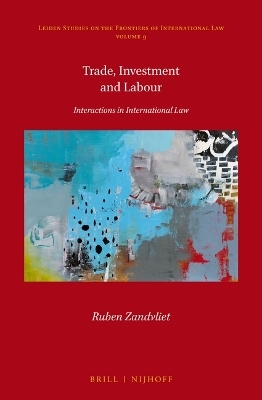
Trade, Investment and Labour
Martinus Nijhoff (Verlag)
978-90-04-43984-9 (ISBN)
Are states allowed to prohibit the importation of products made by children? Can foreign investors claim compensation when their host state raises the minimum wage? In this book Ruben Zandvliet examines the ways in which international trade and investment law enables and constrains the ability of states to regulate labour. In addition to analysing the interactions between the relevant norms, it explains how linkages between international economic law and labour navigate between two notions: fair competition and fundamental rights. This study is agnostic about which of these objectives ought to shape international law, thus allowing a critical examination of the relevant rules of public international law, as well as legal and economic scholarship.
Ruben Zandvliet, Ph.D., is the Deputy Director for Standards at Shift, the leading center of expertise on the UN Guiding Principles on Business and Human Rights.
Acknowledgements
Abbreviations
Table of Treaties
Table of Cases
1 Introduction
2 Economic Competition and the Development of International Labour Law
2.1 Introduction
2.2 The Origins of International Labour Law
2.2.1 Introduction
2.2.2 Economic Competition and the Need for International Cooperation
2.2.3 The Quid Pro Quo between Improving Labour Standards and Tariff Reductions
2.2.4 The International Association of Labour Legislation and the Emergence of Multilateralism
2.3 The International Labour Organization
2.3.1 Introduction
2.3.2 The Establishment of the ilo and Its Institutional Framework
2.3.3 The Purpose of the ilo
2.3.4 The Legal Framework
2.4 Implementation of ilo Standards
2.4.1 Introduction
2.4.2 The ilo Supervisory Procedures
2.4.3 Interpretation of ilo Conventions
2.4.4 Perspectives on the Effectiveness of the ilo in Relation to the Trade-Labour Debate
2.5 Concluding Remarks
3 Multilateral Trade Law and Labour
3.1 Introduction
3.2 Introduction to Multilateral Trade-Labour Linkage
3.2.1 Introduction
3.2.2 Labour and Employment in the Havana Charter
3.2.3 Labour and Employment in the gatt and wto Era
3.3 Labour-Related Trade Measures under wto Law
3.3.1 Introduction
3.3.2 Foreign Labour Conditions as Unfair Trade Practices
3.3.3 Foreign Labour Conditions as Nullification and Impairment of Benefits
3.3.4 Trade Measures in Response to Foreign Labour Conditions
3.4 Justifications under the gatt General Exceptions Clause
3.4.1 Introduction
3.4.2 Article xx(a): The Protection of Public Morals
3.4.3 Article xx (b): The Protection of Human Life or Health
3.4.4 Article xx(d): Securing Compliance with Non-inconsistent Laws or Regulations
3.4.5 Article xx(e): Products of Prison Labour
3.4.6 The Chapeau-Test
3.5 Labour Conditionality in the Generalised System of Preferences
3.5.1 Introduction
3.5.2 The Generalised System of Preferences
3.5.3 Labour Conditionality in the United States’ gsp
3.5.4 Labour Conditionality in the European Union’s gsp
3.6 Concluding Remarks
4 International Investment Law and Labour
4.1 Introduction
4.2 Introduction to Investment-Labour Linkage
4.2.1 Introduction
4.2.2 The Deregulation of Labour
4.2.3 The Regulation of Labour
4.2.4 The Regulation of Investors
4.3 Investment Protection Standards in Relation to Labour Regulation
4.3.1 Introduction
4.3.2 Direct and Indirect Expropriation
4.3.3 Fair and Equitable Treatment
4.3.4 Full Protection and Security
4.3.5 Non-discrimination
4.4 Strategies to Increase Host States’ Regulatory Autonomy
4.4.1 Introduction
4.4.2 Legislative Strategies
4.4.3 Interpretative Issues
4.5 Provisions Addressing the Conduct of Investors
4.5.1 Introduction
4.5.2 Types of csr Clauses
4.5.3 Functions of csr Clauses
4.5.4 Towards Binding Obligations for Business Enterprises
4.6 Concluding Remarks
5 Preferential Trade and Investment Agreements and Labour
5.1 Introduction
5.2 Provisions Addressing Derogation from Labour Standards
5.2.1 Introduction
5.2.2 The Types and Functions of Non-derogation Clauses
5.2.3 The Economic Benchmark
5.2.4 Specific Characteristics of Enforcement Obligations
5.3 Provisions Addressing the Improvement of Labour Standards
5.3.1 Introduction
5.3.2 Types of Improvement Clauses
5.3.3 The Use of Indeterminate Benchmarks in Improvement Clauses
5.3.4 The Legal Character of Improvement Clauses
5.3.5 Reform Options for Improvement Clauses
5.4 Provisions Addressing Domestic Governance Issues
5.5 Delimitations of Labour Provisions through Federal Clauses
5.6 Implementation and Enforcement of Labour Provisions
5.6.1 Introduction
5.6.2 Pre-ratification Impact Assessments and Conditionalities
5.6.3 Post-ratification Implementation and Monitoring
5.6.4 Dispute Settlement
5.7 Relationship between ilo Standards and ptia Labour Provisions
5.7.1 Introduction
5.7.2 Multiplicity of Labour Norms and the Risk of Fragmentation
5.7.3 The vclt Framework and Early Practice in ptia Labour Disputes
5.7.4 Lessons from the Integration of Human Rights and Labour Law
5.8 Concluding Remarks
6 Conclusions
6.1 Introduction
6.2 Constraining and Supporting Domestic Labour(-Related) Law
6.3 Interactions between International Trade, Investment and Labour Law
6.4 Evaluating Economic Perspectives in Light of Legal Practice
6.5 Navigating between Fair Competition and Fundamental Rights
6.6 Outlook for Labour Standards in Trade and Investment Agreements
Bibliography
Other Sources
Index
| Erscheinungsdatum | 26.09.2022 |
|---|---|
| Reihe/Serie | Leiden Studies on the Frontiers of International Law ; 9 |
| Sprache | englisch |
| Maße | 155 x 235 mm |
| Gewicht | 814 g |
| Themenwelt | Recht / Steuern ► EU / Internationales Recht |
| Recht / Steuern ► Öffentliches Recht ► Völkerrecht | |
| ISBN-10 | 90-04-43984-6 / 9004439846 |
| ISBN-13 | 978-90-04-43984-9 / 9789004439849 |
| Zustand | Neuware |
| Haben Sie eine Frage zum Produkt? |
aus dem Bereich


